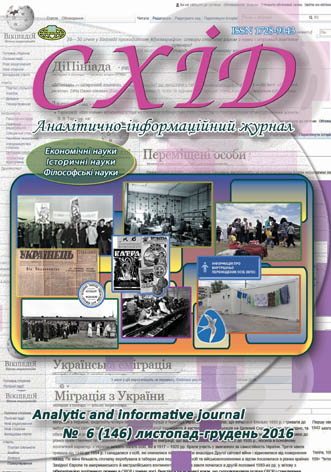Semiotic strategy of non-representation: conflict between reprezentament and reference
DOI:
https://doi.org/10.21847/1728-9343.2016.6(146).86927Keywords:
non-representation, representation, reference, semiotics, social construction, social realityAbstract
The idea of representation is a fundamental factor of the social privilege for any social institution that lies in a desire to establish the firmly true descriptions of the world, set facts and objective truths. Yet, it should be noted that assertions based on representation are not only the prerogative of science, philosophy, religion, art and politics, but also the immediate reality of social life. A denial of representationalism inevitably leads to the relativism as the abruption of a language from reality. Since then, a language can assert anything about the reality without accordance to the reality proper, and thus, distort the reality to its substitute - a new artistic reality. Post-analytical philosophy covers the issues under the term anti-representationalism, i.e. reject representation (meaning passive display of autonomous objects) as a productive notion or a concept. Representatives of new historicism, on the contrary, understand representation as a productive notion through which cultural creativity can be studied in performative aspects.
Research of representation as fine art is an integrated part of social processes of separation, withdrawal, acceptance and domination, and is generally a social expression of power-strength processes. Post-analytical philosophy in the concept of anti-representationalism does not thematise artistic and non-artistic signs specifics. A language is claimed not to reflect passively autonomous objects in the world like a mirror (represent), but constitutes them as technical artistic texts in a fundamental sense. Theory of language representation in the post-analytical philosophy progresses into language instrumentalism - a language is understood as an important tool with the help of which the humankind aligns with the reality.
Downloads
References
Bílek, Petr (2012), Reprezentace: metafora, pojem či koncept?, Jazyky reprezentace. Reprezentace ve filozofii a v myšlení o umění a kultuře, Akropolis, Praha, s. 11-30 (сzech).
Fish, Stanley (1980), Is There a Text in This Class?: The Authority of Interpretive Communities, Harvard University Press, Cambridge/London, pp. viii + 394 (eng).
Glanc, Tomáš (2012), Vzpírání se reprezentaci: Poetika přítomnosti, Jazyky reprezentace. Reprezentace ve filozofii a v myšlení o umění a kultuře, Akropolis, Praha, s. 52-61 (сzech).
Iser, W. (1989), Prospecting: From Reader Response to Literary Anthropology, Johns Hopkins University Press, Baltimore, 328 p. (eng).
Iser, W. (1993). Representation: A Performative Act, The Aims of Representation: Subject/Text/History, Stanford University Press, Stanford, s. 217-232 (eng).
Iser, W. (1993). The Fictive and the Imaginary: Charting Literary Anthropology, Johns Hopkins University Press, Baltimore, pp. xix + 347 (eng).
Rorty, R. (1990), Objectivity, Relativism, and Truth, Philosophical Papers, Vol. 1, Cambridge University Press, Cambridge, 226 p. DOI: 10.1017/cbo9781139173643
Rorty, Richard (1999), Philosophy and Social Hope, Penguin Books, New York, 320 p. (eng).
Rorty, Richard (1979), Philosophy and the Mirror of Nature, Princeton University Press, Princeton, 401 p. (eng).
Skalický, David (2012), Literatura a zrcadlo přírody: Některé souvislosti Rortyho antireprezentacionalismu a myšlení o literatuře, Jazyky reprezentace. Reprezentace ve filozofii a v myšlení o umění a kultuře, Akropolis, Praha, s. 62-73 (сzech).
Downloads
Published
How to Cite
Issue
Section
License
Copyright (c) 2017 Volodymyr Kovchak

This work is licensed under a Creative Commons Attribution-NonCommercial-NoDerivatives 4.0 International License.
1. Authors bear responsibility for the accuracy of facts, quotations, numbers and names used.
2. Manuscripts are not sent back.
3. The publisher does not always agree with the authors' opinion.
4. The authors reserve the right to authorship of the work and pass the first publication right of this work to the journal under the terms of a Creative Commons Attribution-NonCommercial-NoDerivatives 4.0 International License. This license allows others to distribute (copy) the published work for non-commercial purposes, provided there is mandatory attribution to its authors and a link to the first publication in our journal.
5. The authors have the right to conclude separate supplement agreements that relate to non-exclusive work distribution in the form in which it has been published by the journal (for example, to upload the work to the online storage of the journal or publish it as part of a monograph), provided that the reference to the first publication of the work in this journal is included.

